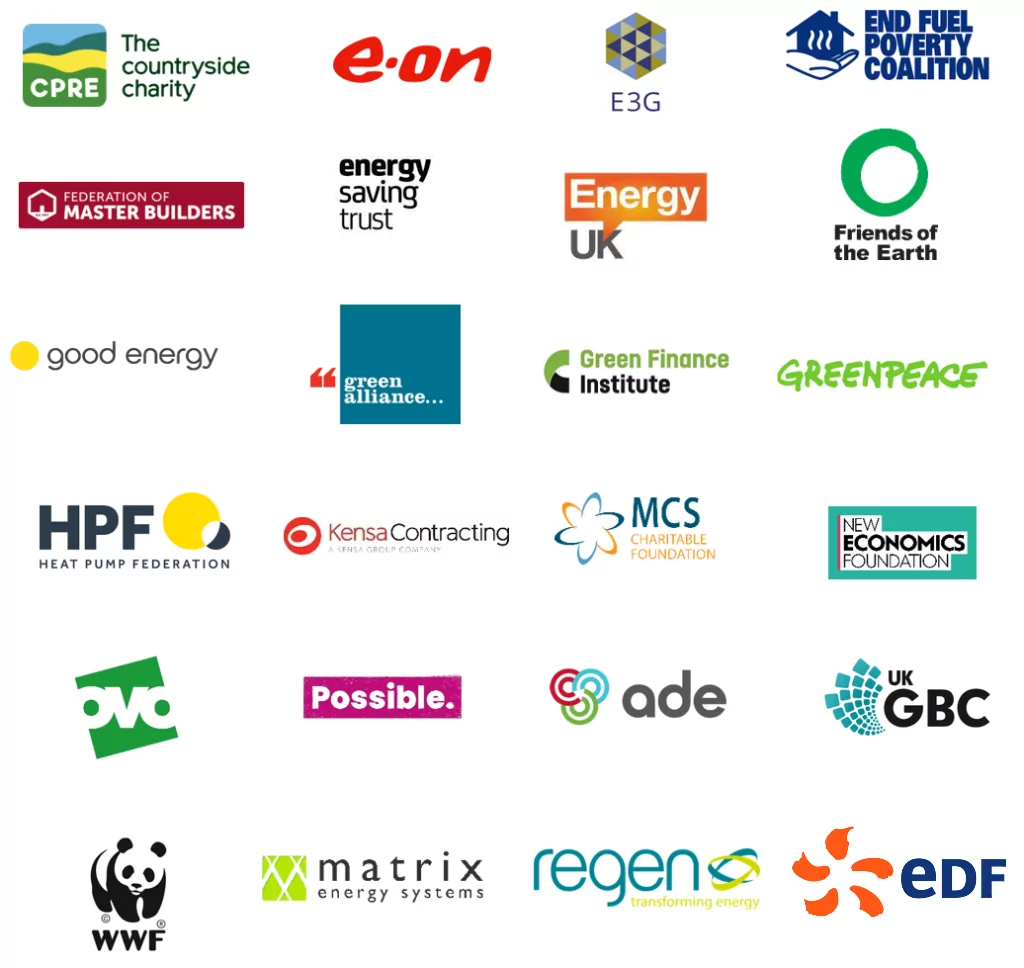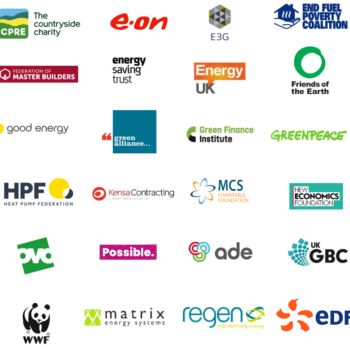- Leading businesses and civil society organisations urged the Government today to introduce a Fair Heat Deal to make moving from fossil fuel boilers to clean heat pumps attractive for all.
- The Deal would provide free heat pumps and insulation for the fuel poor. For everyone else it would equalise the cost of a heat pump and a fossil fuel boiler and ensure running a heat pump is always cheaper.
- The government’s plan to decarbonise UK buildings – responsible for nearly a quarter of climate emissions – is to be announced imminently.
Story
Over twenty businesses, energy suppliers, green and anti-poverty groups [1] have called for the Government to back a Fair Heat Deal to make the transition away from fossil fuel boilers attractive, easy, and fair for all.
The groups want the Government to ensure it is affordable for every household to install and run a heat pump. This would help households benefit from cheaper energy bills and warmer, healthier homes, while slashing carbon emissions.
Buildings in the UK are responsible for nearly a quarter of climate emissions. Moving away from polluting fossil fuel boilers is necessary to decarbonise Britain’s buildings and to get on track to net-zero.
The UK’s scientific advisors, the Climate Change Committee, say heat pumps will play the largest role in decarbonising Britain’s heat supply. [2] Air source heat pumps work like fridges in reverse, extracting the warmth in the air outside and compressing it to heat the building inside.
The Fair Heat Deal would stimulate the heat pump market, helping to accelerate a reduction in technology and installation costs [3] as economies of scale are achieved. This means the costs of subsidising the programme could rapidly fall over time.
By boosting economic activity, the Fair Heat Deal could generate as much growth as any infrastructure programme but would have the extra benefits of creating good jobs in every part of the UK while slashing energy bills [4]. The UK has a world-leading heat appliance manufacturing industry. This means accelerating the deployment of heat pumps could create a massive inward investment and global export opportunity [5] as other countries look to decarbonise heat.
The groups urged Government to provide comprehensive support for households moving to heat pumps. The Fair Heat Deal would include:
- Moving environmental levies off electricity bills to ensure it is always cheaper to run a heat pump than a boiler.
- Free heat pumps and insulation for fuel poor and low-income households.
- Grants for everyone else to equalise the cost of a new heat pump with a fossil gas boiler.
- Financial incentives including zero VAT on green home products and installation and green Stamp Duty to reduce the cost of low carbon homes.
- Strong consumer protections.
- A Warm Homes Agency to train installers, create quality green jobs in every part of the country and maintain high standards.
Supporters of the Fair Heat Deal
Alan Brown MP (SNP), CPRE-The Countryside Charity, End Fuel Poverty Coalition, E.ON, E3G, Federation of Master Builders, Energy Saving Trust, Energy UK, Friends of the Earth, Good Energy, Green Alliance, Green Finance Institute, Greenpeace UK, Ground Source Heat Pump Association, Heat Pump Federation, Kensa Contracting, Caroline Lucas MP (Green Party), MCS Foundation, New Economics Foundation, OVO, Possible, Regen, The Association for Decentralised Energy, UK Green Buildings Council, WWF
Quote
Juliet Phillips, Senior Policy Advisor at E3G said:
“Moving from a gas boiler to a heat pump is one of the biggest carbon savings a household can make to fight climate change. But it must be affordable and we urge the Government to support our Fair Heat Deal to ensure no one is left behind in the green industrial revolution. If done right the UK can lead the world in reducing carbon emissions from heat while slashing energy bills, boosting the economy and protecting the fuel poor.”
Energy Saving Trust CEO Mike Thornton
“With the climate emergency upon us, there is no time to waste and we need to take positive action. We have to make our homes more energy efficient and move away from reliance on fossil fuels for heating. Heat pumps are an important low carbon heating technology that will help us meet net zero. A Fair Heat Deal will make heat pumps more attractive to householders and help them to switch over to low carbon heating. For the UK to reach its net zero targets, we need real pace and scale in rolling out heat pumps. A Fair Heat Deal will provide the confidence, clarity and certainty which will unlock the investment required for this.”
Tom Fyans, Campaigns and Policy Director at CPRE, the countryside charity, said:
“Everyone deserves a secure, affordable and warm place to live. But we have some of the least energy efficient homes in Europe, and nowhere is this more desperate than in the many cold, leaky rural homes. This Fair Heat Deal will be crucial to not only reducing our carbon emissions but will also lower energy bills and protect those at risk of fuel poverty in rural areas. It’s time for the government to match endless rhetoric with action by ensuring it’s affordable for every household to install and run a heat pump.”
Jessica Tan, Managing Director of OVO Smart Home said:
“Every home and every family is different so we need to think as widely as possible about the incentives needed to switch away from gas boilers. Following the success of renewables and electric vehicles there is a strong justification for financial incentives today to help make the industry cost competitive as soon as possible in the future. We also need to stimulate the training and employment opportunities for the vast army of people needed to install zero carbon heat up and down the country. Support for zero carbon homes is critical for the environment and great for the UK economy.”
Emma Pinchbeck, CEO at Energy UK said:
“It’s essential that we provide customers with the right financial support, incentives and advice to move to less polluting heating for their homes, so we welcome the proposals in the Fair Heat Deal. Doing so is a major challenge but one that can’t be put off any longer if we are to reach the Net Zero target.
Heat pumps will play a major role in this transition and Government needs to put in place the right measures to promote the rapid uptake required by the 2028 target – as well maintaining a high standard of customer protection and ensuring accurate information on all the choices available.”
Kate Blagojevic, Head of Climate at Greenpeace UK said:
“Too many of us have to live in homes which are cold, expensive to heat and are bad for the climate. Our future is a country where we all enjoy warm, well insulated homes heated by climate friendly tech like heat pumps. Getting there requires the government to step up, be the climate leaders they claim they are and start backing this vision with money to make it happen. Supporting the public to insulate their homes and switch out gas boilers for heat pumps will create jobs, cut emissions and lower bills. It’s essential and good for people and the economy.”
Joe Tetlow, Senior Political Advisor at Green Alliance said:
“The Heat and Buildings Strategy should be setting out exactly how greener homes will be achieved. Instead, it’s leaking like a draughty house, with briefing and speculation filling the void where published policy and positive progress should be. The government needs to seize back the agenda, be bullish about its commitment to decarbonising homes and crucially, its intention to protect consumers with a Fair Heat Deal.”
Ian Rippin, CEO at MCS Foundation said:
“How we heat our homes is one of the highest contributors to our carbon footprints. Installing renewable technology can play a significant role in helping to make our homes greener for a more sustainable future. However, we must not shy away from the fact that, this technology is significantly more expensive than gas boilers as things stand, placing them out of reach to the average homeowner, unless financial support is given. MCS is calling for a reduction in VAT, new tax incentives and long-term grants to bring heat pump costs in line with typical boiler costs today. Without meaningful, well-informed plans and long-term policies to decarbonise the nation’s homes, the grasp on the government’s net zero targets will diminish.”
Available for comment
Juliet Phillips is available for commentary – please contact her directly:
m: +44 (0)7548 097 061, juliet.phillips@e3g.org
Notes to Editors
- CPRE-The Countryside Charity, End Fuel Poverty Coalition, E.ON, E3G, Federation of Master Builders, Energy Saving Trust, Energy UK, Friends of the Earth, Good Energy, Green Alliance, Green Finance Institute, Greenpeace UK, Heat Pump Federation, Kensa Contracting, MCS Foundation, New Economics Foundation, OVO, Possible, The Association for Decentralised Energy, UK Green Buildings Council, WWF
- See https://www.theccc.org.uk/2021/02/01/the-numbers-behind-the-budget-six-ways-to-explore-the-sixth-carbon-budget-dataset/
- See for instance https://inews.co.uk/inews-lifestyle/money/ethical-money/fearmongering-on-low-carbon-heat-is-hot-air-1037403 .
- The Government’s December 2020 Energy White Paper (p. 116) refers to “annual energy bill savings of £7.5bn”, “a persistent uplift in productivity and consumer spending to drive economic growth” and “hundreds of thousands of high quality green jobs right across the UK”.
- Research commissioned by the Government finds that there is significant scope for inward investment and heat pump exports as the domestic heat pump market grows. BEIS (2020) Heat pump manufacturing supply chain research project.
Principles of the Fair Heat Deal in full:
- Offer up-front financial support for households to buy heat pumps. This is essential to make the transition fair, while pump-priming the market to drive costs down. Grants should cover the entire cost of heat pumps for low-income households. For everyone else, grants should be offered at a level that aims to make the upfront costs of installing a heat pump and complementary energy efficiency measures the same as replacing a gas boiler, with subsidies reducing over time as costs fall. Incentives and subsidies can support the roll-out of attractive financial solutions to bring in private capital, or blend public and private capital, to further support households and communities.
- Seek to ensure lower running costs for heat pumps compared to gas boilers – for example by removing environmental levies from electricity bills – while protecting the most vulnerable who live in or are at risk of fuel poverty.
- Introduce incentives that encourage households to make green heat choices, such as Green Stamp Duty that is lower for buyers of low carbon, energy efficient homes, and zero VAT on green products and renovation works that decarbonise homes.
- Set up a Warm Homes Agency to oversee the scaling of existing initiatives and programmes to protect consumers and, through skills and training, help to create thousands of secure, well-paid green jobs across the country, and ensure these opportunities are just as attractive as equivalent roles in gas heating installation and maintenance today.
- Ensure that there are impartial energy advice and support services for consumers.

